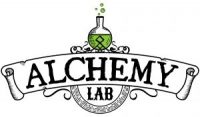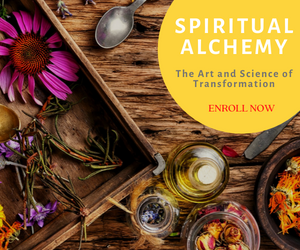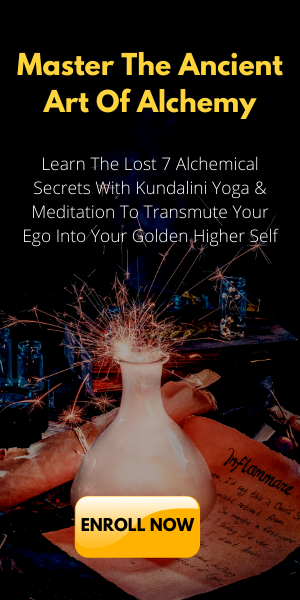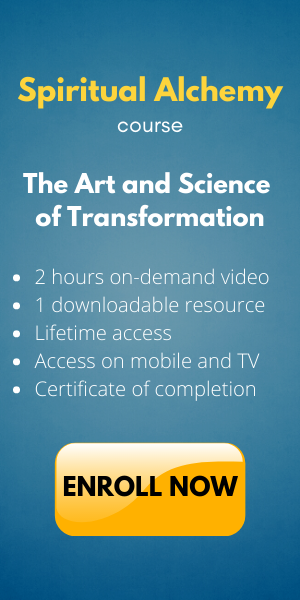Interview with an Alchemist
Interview with an Alchemist: Dennis William Hauck
Question: Most people think of alchemy as an early form of chemistry or see it as part of the realm of magic. What is alchemy really?
Hauck: A single definition of alchemy is always hard to agree upon, since it is a discipline that works on many different levels. We now know that it was not only a precursor of chemistry but also of psychology, medicine, and even quantum physics. It’s been described as the Philosophy of Fire, the Art of Transformation, the Science of Soul, and in many other ways. Unquestionably, alchemy the oldest science, yet it is also part of our religious and spiritual traditions. And it is magic too, just like any future science based on hidden principles would be magic to those not familiar with it.
Question: What first got you interested in alchemy?
Hauck: I was in graduate school in mathematics at the University of Vienna, when I came across a collection of old alchemy manuscripts in the library. Vienna and nearby Prague were centers for the study of alchemy in the sixteenth century and hundreds of alchemists migrated to the area. The first time I opened one of their dusty treatises, the ancient tradition seemed to come alive in me. I gave up my formal studies and spent my time translating alchemy books and meditating on the strange drawings they contained, which I felt carried profound meaning. I was convinced that their Great Work was the supreme truth in nature, and the alchemists were really explorers of consciousness far ahead of their time.
Question: You gave up a career in mathematics to pursue a defunct Medieval discipline?
Hauck: Not so hard to understand, really. I was fed up with American diploma mills in which math was like a competitive sport to see who could break chalk the fastest on blackboards. There is no beauty in math when it is nothing but technique and speed. I wanted to be a mathematician, but I hated computers. So, I went to Vienna to study mathematics in the intuitive tradition of Kurt Godel, who had been a professor there. That is where I discovered that the alchemists were centuries ahead of modern mathematicians in their grasp of reality.
Question: How could the alchemists know more than modern mathematics, the Queen of the Sciences?
Hauck: It is not generally known, but Godel proved that ultimately, logical thinking can never know truth. Without going into a lot of detail, he developed an introspective form of mathematics that used self-referencing propositions to expose fundamental problems in the foundations of mathematics. His Incompleteness Theorem demonstrated that no matter what “axiomatic system” or logical approach you take — no matter how complicated — you will never be able to explain the complexity of the universe. In other words, provability is a weaker notion that truth. I can show that right now, in fact. Just reflect on the following sentence: “This statement is false.” At first you think it is a false statement, but you realize if the statement is really false, then it must be a true statement; yet if it is a true statement, it cannot be a false statement. Try it! You get caught in what Godel called a Strange Loop. So, there is something fundamentally flawed in our idea of yes/no, true/untrue, and that means there is something fundamentally wrong with binary logic itself, which is the heart of computers.
Question: What has that got to do with alchemy?
Hauck: The alchemists realized that within the Strange Loop is where ultimate truth lies. Most of their statements and drawings are actually Strange Loops that have confounded people ever since they were first created. In fact, the symbol for a Strange Loop is how the alchemists depicted the ultimate mystery of the universe: the Ouroboros, the snake eating its own tail; and the solution to any Strange Loop can be found in the caption the alchemists gave to their drawings of the Ouroboros. It read “All Is One.” Really, it is an ancient idea. It is what Socrates meant by “Know thyself,” although I believe that the earliest statement on this planet of that concept was given to us in the Emerald Tablet, which is the source and inspiration for all of alchemy. Every practicing alchemist had a copy of the tablet close at hand and constantly referred to the “secret formula” it contained.
Question: Isn’t the Emerald Tablet the source of the phrase “As Above, So Below?”
Hauck: Yes, though it really says “That which is Below corresponds to that which is Above, and that which is Above corresponds to that which is Below.” That describes a much more dynamic system than just saying “As Above, So Below.” The Above and the Below are intimately related, constantly flowing into one another and eternally changing into one another. That’s the image of the Ouroboros. But the biggest mistake people make is to think of them as static concepts, such as seeing the Above as heaven or the Below as hell.
Question: How did the alchemists interpret the Above and the Below?
Hauck: Not only the alchemists but the ancients in general saw the Above as the realm of the One Mind, the unnamable creator. It is divine thought or the Word seeking manifestation. The Below was the realm of the One Thing, the actual manifestation of divine thought. So the Above is full of the light of Mind, while the Below is dark matter. Obviously, our notions of heaven and hell originated from these ideas, yet there are important differences in the way modern people see the Above and Below and the way the ancients saw them. For them both heaven and hell (the Above and the Below) were close at hand. They felt they were surrounded by manifestations of the divine Mind, and all of matter was alive with the signature of God. And all they had to do was close their eyes to see into Above and meditate to be in the divine presence, for the light of the One Mind above was reflected in the mind of man below. Above and Below were not faraway places you went to after you died. Doorways to them were everywhere to be found. The One Mind was considered the source of thought, imagination, and spirit; the One Thing was the source of sensation, feelings, and soul.
Question: Where did the Emerald Tablet come from?
Hauck: In my book, THE EMERALD TABLET, I trace the tablet from the Egyptian inventor of math and science, Thoth, to the Pharaoh Akhenaten and Moses, then down to Alexander the Great and the first-century sage Apollonius of Tyana. Before Thoth we can only speculate, but there are tantalizing bits of evidence that suggest mysterious visitors came to Egypt over 12,000 years ago and brought with them a powerful spiritual technology, which they passed down to future generations in a time capsule of wisdom that became known as the Emerald Tablet. The Book of What Is In the Daat, the Book of the Dead and other Egyptian funerary texts, and numerous rebirth texts refer to a remote epoch known as the “Zep Tepi,” a time before the Great Flood when the godlike beings came to earth and established their kingdom in Egypt. They included Thoth, the “god” of science and mathematics, who is said to have written the Emerald Tablet and hid it in a pillar at Hermopolis to preserve it through the coming world deluge.





